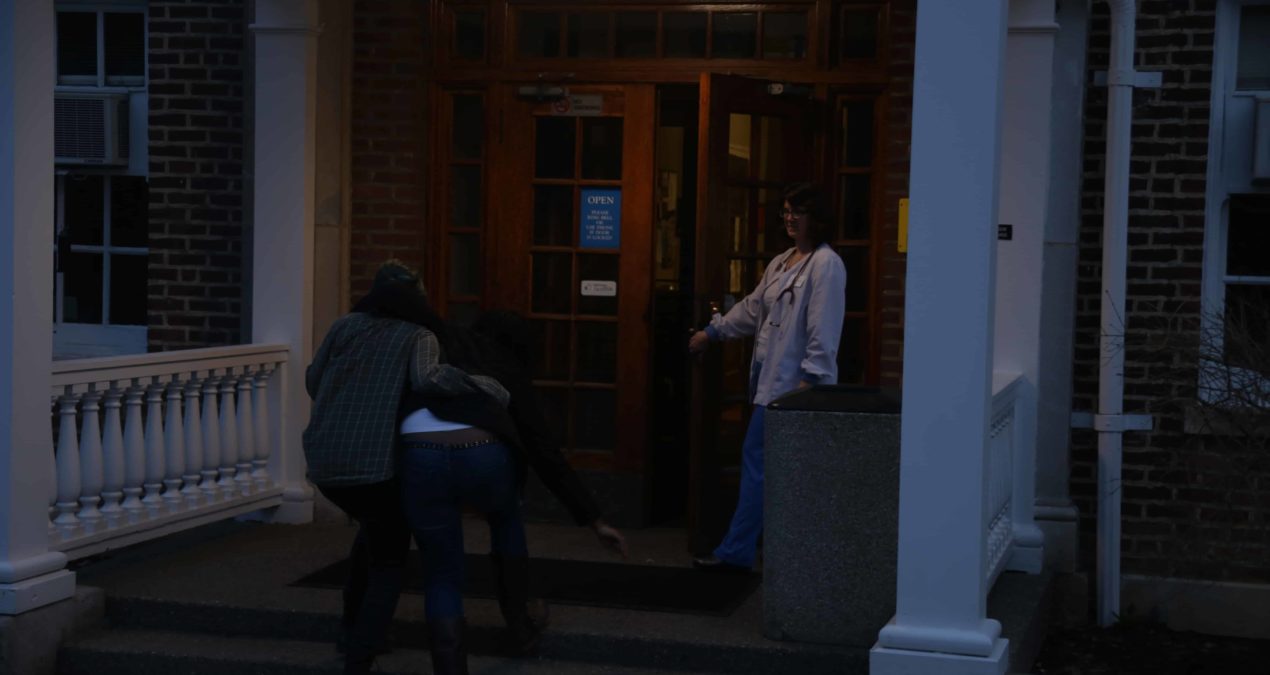By Nick Caravana
Special to the Denisonian
A weekend night gone wrong for a Denison student can end up with a visit to the Whisler Center for Student Wellness Health Services. “Whisler,” as it is simply called on campus, is an unassuming building on the east side of campus behind Huffman Hall.
But inside its walls, vital services are performed every day to ensure the well-being and health of approximately 2,200 students on campus. As a 24-hour health care facility on Denison’s campus, it can become busy late on Friday and Saturday nights.
Students under the influence of drugs or alcohol are brought into the facility by Denison security guards, courtesy ambulance, or concerned friends to be evaluated and cared for by the Whisler staff. After entering Whisler’s old oak doors, the Alcohol Overdose Assessment begins.
According to Associate Director of Health Services Molly Thurlow-Collen, the assessment begins upon a student arriving in the health services center. The intoxicated student is walked to an examination room or given a seat inside the entrance hallway while being monitored by the nurse’s assistant. Meanwhile, the College Health Registered nurse collects information from security and/or friends about the night’s events leading the student to Whisler.
After this consultation, the Registered Nurse assesses the student in question. In this initial conversations and meeting, the nurse searches for signs of “physical trauma, potential sexual assault, vomiting, significant past medical history and the current medications of the student,” says Thurlow-Collen.
The next set of questions attempt to determine the night’s history, such as the starting time of consumption, type of alcohol, if the patient poured all his or her own drinks, time of last drink and known other drugs used.
Molly Thurlow-Collen emphasized the importance of the knowing the timing of the last drink because “Blood alcohol level goes up over the course of the hour following your last drink.” This allows the nurse to determine if the worst is over or still to come.
Once the patients and the night’s history have been captured a mental assessment of the student begins.
The nurse begins by choosing a mental status for the patient ranging from alert and calm to agitated or comatose. Then evaluations are made in regard to the patient’s orientation of place and time, thought processing ability and quality of speech. Next, the nurse tests the student’s ability to follow commands, their emotional state and manner of walking. The nurse uses these assessments collectively to help determine the patient’s intoxication level and to indicate “if they [the student] are doing something else, such as ecstasy or cocaine combined with the alcohol,” said Thurlow-Collen.
Once this assessment is taken, the nurse begins to test vital signs. The nurse measures the patient’s body temperature, blood pressure and pulse. Next, a visually guided movements test is administered to help the nurse determine if the patient has a dangerous Blood Alcohol Content level.
The nurse then checks out any head or body injuries and gives a full separate report if one is present. Finally, the information collection is complete and the nurse chooses between three options about how patient care will proceed: send the student to the hospital, keep the student in Whisler over night or keep the student in the hallway until it is safe for them to return to their room on campus.
A nurse only chooses to send the student to the hospital if he/she is “beyond Whisler’s scope of practice and ability to monitor,” Thurlow- Collen said. If this option is chosen, the student is sent to the emergency department at the local hospital where a higher level of care can be given.
If the nurse chooses the second option of keeping the student overnight when he/she believes the student should be monitored throughout the night but is not intoxicated enough to have to go to the hospital, the student is then monitored every 20-30 minutes for the first 3 hours, and then every hour for the final 3 hours. Also, the next morning the now sober student will have an appointment with a doctor or nurse practitioner. This is a confidential conversation about the students drinking history and the past night’s events. The charge for an “Overnight, Alcohol Observation and Care” at Whisler is $120. But the staff urges students to always put safety first and not let cost be a deterring factor when considering calling for help in a potentially dangerous scenario with a drunk student or friend.
The final choice for the nurse is to give the student a seat in the hallway for about an hour. The student is monitored every 20 minutes and then sent back to their room with their friends, security, or if well enough, by themselves. A student will incur absolutely no charge if this option is chosen by the Registered Nurse.
Associate Director of Health Services Molly Thurlow-Collen emphasised that “Everything he or she said that night to the Registered Nurse or to the MD or Nurse Practitioner that see them the next morning by students in the alcohol assessment is confidential and protected by law. Students need not fear consequences for anything discussed between them and the nurse and should be as honest as they can to receive the most appropriate treatment.”
Photo courtesy Nelson Dow; this photo was staged.

